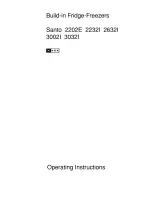
About 12 hours prior to
defrosting set a lower
temperature in order to build up
sufficient chill reserve in case
of any interruption in operation.
A certain amount of frost will always form
on the freezer shelves and around the top
compartment.
Defrost the freezer when the frost layer
reaches a thickness of about 3-5 mm.
1. Switch off the appliance or pull out
electrical plug from the wall socket.
2. Remove any stored food and put it in a
cool place.
CAUTION! A temperature
rise of the frozen food
packs during defrosting
may shorten their safe
storage life.
Do not touch frozen goods
with wet hands. Hands can
freeze to the goods.
3. Leave the door open. Protect the floor
from the defrosting water e.g. with a
cloth or a flat vessel.
4. In order to speed up the defrosting
process, place a pot of warm water in
the freezer compartment. In addition,
remove pieces of ice that break away
before defrosting is complete. Use the
supplied ice scraper for this purpose.
5. When defrosting is complete, dry the
interior thoroughly. Keep the ice
scraper for the future use.
6. Switch on the appliance and close the
door.
7. Set the temperature regulator to obtain
the maximum coldness and run the
appliance for at least 3 hours using
this setting.
Only after this time put the food back into
the freezer compartment.
Period of non-operation
When the appliance is not in use for long
period, take the following precautions:
1. Disconnect the appliance from
electricity supply.
2. Remove all food.
3. Defrost the appliance.
4. Clean the appliance and all
accessories.
5. Leave the doors open to prevent
unpleasant smells.
TROUBLESHOOTING
WARNING! Refer to Safety
chapters.
What to do if...
Problem
Possible cause
Solution
The appliance does not op‐
erate.
The appliance is switched
off.
Switch on the appliance.
The mains plug is not con‐
nected to the mains socket
correctly.
Connect the mains plug to
the mains socket correctly.
There is no voltage in the
mains socket.
Connect a different electrical
appliance to the mains sock‐
et. Contact a qualified elec‐
trician.
32 Progress
















































